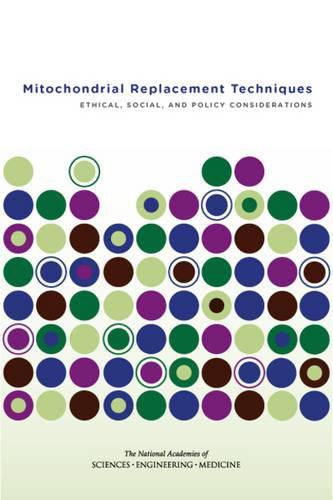Readings Newsletter
Become a Readings Member to make your shopping experience even easier.
Sign in or sign up for free!
You’re not far away from qualifying for FREE standard shipping within Australia
You’ve qualified for FREE standard shipping within Australia
The cart is loading…






Mitochondrial replacement techniques (MRTs) are designed to prevent the transmission of mitochondrial DNA (mtDNA) diseases from mother to child. While MRTs, if effective, could satisfy a desire of women seeking to have a genetically related child without the risk of passing on mtDNA disease, the technique raises significant ethical and social issues. It would create offspring who have genetic material from two women, something never sanctioned in humans, and would create mitochondrial changes that could be heritable (in female offspring), and therefore passed on in perpetuity. The manipulation would be performed on eggs or embryos, would affect every cell of the resulting individual, and once carried out this genetic manipulation is not reversible.
Mitochondrial Replacement Techniques considers the implications of manipulating mitochondrial content both in children born to women as a result of participating in these studies and in descendants of any female offspring. This study examines the ethical and social issues related to MRTs, outlines principles that would provide a framework and foundation for oversight of MRTs, and develops recommendations to inform the Food and Drug Administration’s consideration of investigational new drug applications.
$9.00 standard shipping within Australia
FREE standard shipping within Australia for orders over $100.00
Express & International shipping calculated at checkout
Mitochondrial replacement techniques (MRTs) are designed to prevent the transmission of mitochondrial DNA (mtDNA) diseases from mother to child. While MRTs, if effective, could satisfy a desire of women seeking to have a genetically related child without the risk of passing on mtDNA disease, the technique raises significant ethical and social issues. It would create offspring who have genetic material from two women, something never sanctioned in humans, and would create mitochondrial changes that could be heritable (in female offspring), and therefore passed on in perpetuity. The manipulation would be performed on eggs or embryos, would affect every cell of the resulting individual, and once carried out this genetic manipulation is not reversible.
Mitochondrial Replacement Techniques considers the implications of manipulating mitochondrial content both in children born to women as a result of participating in these studies and in descendants of any female offspring. This study examines the ethical and social issues related to MRTs, outlines principles that would provide a framework and foundation for oversight of MRTs, and develops recommendations to inform the Food and Drug Administration’s consideration of investigational new drug applications.